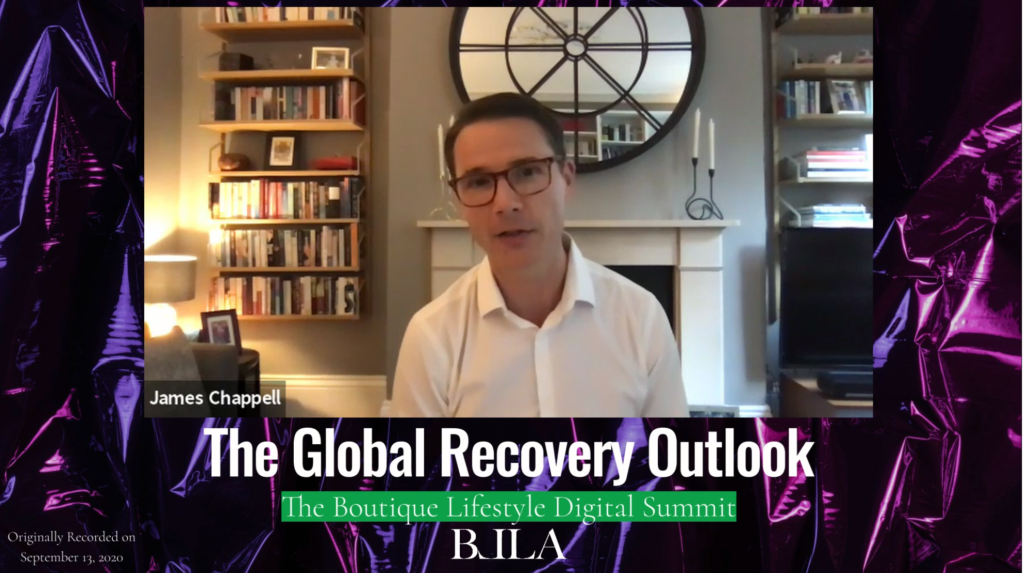Sincerely, BLLA
Quality is the Name of the Game
The Recovery of the Boutique Hotel Market In “The Global Recovery Outlook” at The Boutique Lifestyle Digital Summit, James Chappell, Global Busines...
Sincerely, BLLA
The Recovery of the Boutique Hotel Market In “The Global Recovery Outlook” at The Boutique Lifestyle Digital Summit, James Chappell, Global Busines...
In “The Global Recovery Outlook” at The Boutique Lifestyle Digital Summit, James Chappell, Global Business Director of Horwath HTL, provided a snapshot of where the travel industry currently stands and where it is headed as we look towards recovery. Chappell discussed specific industry data points and some positive circumstances the industry can anticipate.

Chappell kicked off the session with a global report analyzing the question, “Out of ten–one being ‘closed’ and ten being ‘2019’–where are you?” Markets such as Japan and Singapore seem to have a handle on the virus, but even though their hotels are open and ready to welcome guests, there is not much demand for consumers to travel. However, domestic tourism is popular in Asia at the moment, resulting in China’s report of six to eight. There, 70-80% of hotels are open.
These staycations are becoming increasingly popular globally, especially in an easily accessible market like Northern Europe, where countries are generally at level six, according to Chappell. However, Southern Europe, which is relatively dependent on the summer tourism market, resulted in lower numbers on Chappell’s scale. Also ranking low was Africa, ranging from one to four due to a lack of tourists.
Chappell’s next report outlined, “Out of ten–one being ‘stuck’ and ten being ‘making good strides to normality’–where are you?” He pointed out that the key to success during this time is government support, including a level of consistency, awareness of rules, and how long businesses might be able to receive financial support such as loans and grants.
China led this report with a rank of ten – in part, Chappell disclosed, due to the country’s more managed economy, which is able to add more liquidity into the market in a way other travellers are unable to. Chappell believes we should take a closer look at some ways China has been incentivizing travel, and implement these actions in more places across the globe.
Meanwhile, Europe initially had a fantastic response at the beginning of the pandemic: countries in this region laid out very clear objectives to recover and provided optimum government support, such as furlough for workers and eviction suspensions. As revealed by Chappell, this brought Europe’s numbers for this report to between four and six. Now, moving into a second wave during the impending winter season has resulted in inconsistencies, according to the Global Business Director.
North America’s low reported number four comes as a result of a lack of confidence in those that are in charge, Chappell said. However, banks are being considerably more understanding, which has prevented a flood of distress in the marketplace for the moment.
Given this information, Chappell lastly reported on the important question, “With all things being equal, when are we ‘close to normal’?” The Asian Pacific average was 2022; Europe, with a few exceptions, was also 2022; Africa and North America believe things will return to normal in 2023; Latin America believes 2021 will hold the return to a sense of normalcy. Undoubtedly, there has been no dip in appetite for travel and tourism, so Chappell believes it will ultimately come to late 2021-22 due to this pent up demand for travel.
Chappell imparted several positive thoughts on the audience to close out his presentation. To start, he noted, “China is a positive example. If they can do it, we can do it.” China is an immense market, but in proportion to their substantial population, they’ve been able to control it. There is no doubt that we, too, can accomplish this in the US.
Next, Chappell mentioned, “Shades of 2008: pretend and extend.” Similar to the financial crisis of 2008, banks don’t want to be the owners of thousands of hotels, so it’s in their interests to extend liquidity, Chappell explained. He also discussed hospitality as an asset class more attractive than commercial retail. For many years, retail has been suffering because of the shift to online shopping; this year, commercial office space has also suffered due to remote work. This is positive for investments in the travel and hospitality industry.
Chappell also has a firm belief in the boutique side of the hospitality industry as the market begins to recover. He explained, “Quality is the name of the game: if people are travelling, it’s high end.” In this regard, boutique properties are positioned well to entice travellers; the boutique product is more attractive to travellers in the current health crisis than hotels in the mass market are.
And finally, Chappell declared that there is a “sign of life domestically,” which offers a promising future for hotels appealing to more localized audiences as markets begin moving away from international travel. Chappell’s positive outlook on the recovery of the travel industry is something that every hospitality professional should keep in mind as we head into the year ahead.
Shaping Unique Experiences and Future Trends in Hospitality In an evolving travel landscape, boutique hotels have emerged as significant players, r...
We are thrilled to unveil the theme for the 2024 Boutique Hotel Owners Conference by BLLA: "The Mycelium Network." This year, we dived into the profo...